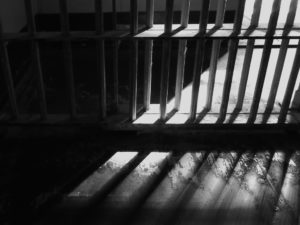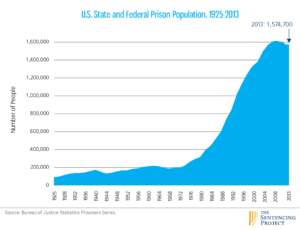
Mass Incarceration is the term used to describe the overwhelming number of people incarcerated in the United States. This country has only 5% of the worlds population, but 25% of the worlds incarcerated population. Over the past three decades we have seen an increase in prison populations of 790%. This graph shows the increase.

The majority of these prisoners are black and brown. These prisoners are usually convicted of nonviolent drug offences. The events, laws, and attitudes that have lead us to this idea of mass incarceration are many. The increased imprisonment of specifically black and brown people can be traced back to slavery. When slavery was abolished white land owners tried everything they could think of to gain access to cheap labor again. This ushered in the age of convict leasing, chain gangs, and indentured servitude. Convict leasing was cost effective for companies, and created extra revenue for towns and officials. But in order to keep convict leasing affordable and effective there needed to be a steady flow of prisoners. This lead to the creation of laws that criminalized every day life for newly freed black citizens. This way the prisons would always be full of able bodied black men who could be leased out.
Today we police black communities heavily, and imprisoning primarily young black men for non-violent acts that are almost always drug related. This increased focus on black communities bares many similarities to the days of convict leasing. It achieves the same goal of funneling young able bodied men into prisons. However nowadays instead of sending prisoners away to work in mines or on fields, prisoners work within the prisons in factories.
Here are some resources to learn more about the origins of mass incarceration and the institutional racism or the carceral system.
Documentaries:
13th, directed by Ana DuVernay. Explores the connections and correlations between slavery, Jim Crow, and mass incarceration. Focusing on out modern day prison crisis.
Slavery by Another Name, directed by Samuel Pollard. Based on the book of the same name by Douglas Blackmon. It explores the history of black people in america, and their lack of freedom.
Reading:
Slavery by Another Name, by Douglas Blackmon. Gives greater depth to the stories depicted in the film. But has a similar end objective of giving a perspective of what lead us to our current prison state.
Information also gathered from the following: ipsnews.net, oxfordbibliographies.com, vox.com